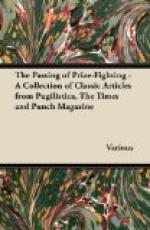* * * * *
Even “KATHARINE TYNAN” must sometimes fall below her own standard, and The Man from Australia (COLLINS), though written with considerable grace and charm, is too thin in plot to be altogether satisfactory. John Darling, a youngish man of wealth and an extremely liberal disposition, came from Australia to visit his connexions in the West of Ireland and—if opportunities occurred—to help them. Opportunities did offer themselves in abundance. The Adairs in their various ways were ripe for a benefactor of the Darling type to appear, and John soon got busy. In the course of his activities—for it would have been unkind (and very dull) to bring him all the way from Australia to Ireland just to serve as a travelling relief-fund—he is made to fall in love with one of the Adair girls. And that’s almost the whole story. One may always trust Mrs. HINKSON to get her atmosphere right; but she is not so happy in her attempt to contrast the preternaturally unselfish Darling who, like an earlier Mr. Darling, would have been content to live in a kennel) with the inordinately self-indulgent father of the Adairs.
* * * * *
[Illustration: EPILOGUE]
THE NEW ORDER OF THINGS.
“I assume,” said the Cynic, “that you are sufficiently sanguine to rejoice in the prospects of Peace.”
“I derive a certain satisfaction from those prospects,” replied Mr. Punch on a note of reserve.
“But you ought to be jazzing for joy, like the other fools in their Paradise of nigger minstrelsy.”




